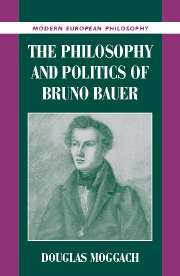Book contents
- Frontmatter
- Contents
- Preface
- THE PHILOSOPHY AND POLITICS OF BRUNO BAUER
- Introduction: “The Friend of Freedom”
- I FOUNDATIONS: AESTHETICS, ETHICS, AND REPUBLICANISM
- 1 “The Idea Is Life”: Bauer's Aesthetics and Political Thought
- 2 “Free Means Ethical”: Idealism, History, and Critical Theory
- II JUDGING THE OLD ORDER
- III THE EMANCIPATORY PROJECT
- IV JUDGING THE REVOLUTIONARY MOVEMENT
- Epilogue: After the Revolution: The Conclusion of the Christian-Germanic Age
- Appendix: Bruno Bauer, “On the Principles of the Beautiful” (1829)
- Notes
- Bibliography
- Index
1 - “The Idea Is Life”: Bauer's Aesthetics and Political Thought
Published online by Cambridge University Press: 05 June 2012
- Frontmatter
- Contents
- Preface
- THE PHILOSOPHY AND POLITICS OF BRUNO BAUER
- Introduction: “The Friend of Freedom”
- I FOUNDATIONS: AESTHETICS, ETHICS, AND REPUBLICANISM
- 1 “The Idea Is Life”: Bauer's Aesthetics and Political Thought
- 2 “Free Means Ethical”: Idealism, History, and Critical Theory
- II JUDGING THE OLD ORDER
- III THE EMANCIPATORY PROJECT
- IV JUDGING THE REVOLUTIONARY MOVEMENT
- Epilogue: After the Revolution: The Conclusion of the Christian-Germanic Age
- Appendix: Bruno Bauer, “On the Principles of the Beautiful” (1829)
- Notes
- Bibliography
- Index
Summary
Bruno Bauer's first critical foray, in 1829, is an assessment of Kantian aesthetics from the perspective of Hegelian logic. His depiction of art as a manifestation of spirit and the already problematical relation of art and religion anticipate the development of his thought on infinite selfconsciousness in the 1840s. The central idea of the early manuscript, a Hegelian conception of the unity of thought and being, is the key to deciphering the complex and elusive meaning of Bauer's critical theory in the Vormärz. This text, adjudicated by Hegel and awarded the Prussian Royal Prize in Philosophy, had been deposited among Hegel's correspondence in the archives of the Humboldt-Universität, Berlin. Presumed lost, it was first published in 1996, in the original Latin, with German translation and commentary. It provides an important new perspective on Bauer's thinking.
On August 3, 1828, the University of Berlin announced its annual Royal Prize competition. The question, set by Hegel, was this:
Whether the principles of the doctrine of the beautiful are adequately expounded by Kant in that part of philosophy which he took to be the critique of judgement, and whether they are consistent with the bases upon which the entire philosophy of this author depends.
The prize, awarded on August 3, 1829, was won by Bruno Bauer, who had submitted a ninety-five-page Latin manuscript, Dissertatio de pulchri principiis. Bauer was then a theology student at the University of Berlin, having enrolled in spring 1828; he was graduated in spring 1832.
- Type
- Chapter
- Information
- The Philosophy and Politics of Bruno Bauer , pp. 21 - 39Publisher: Cambridge University PressPrint publication year: 2003



